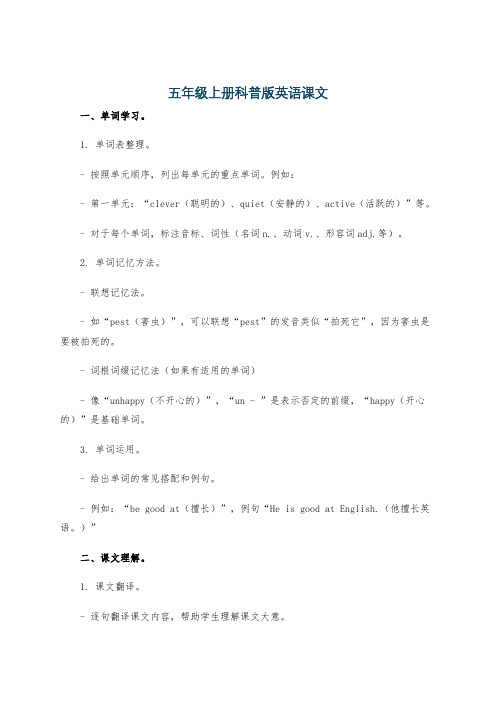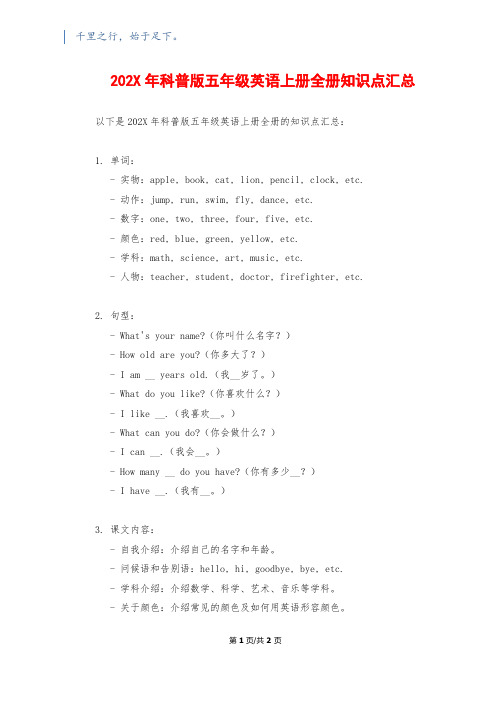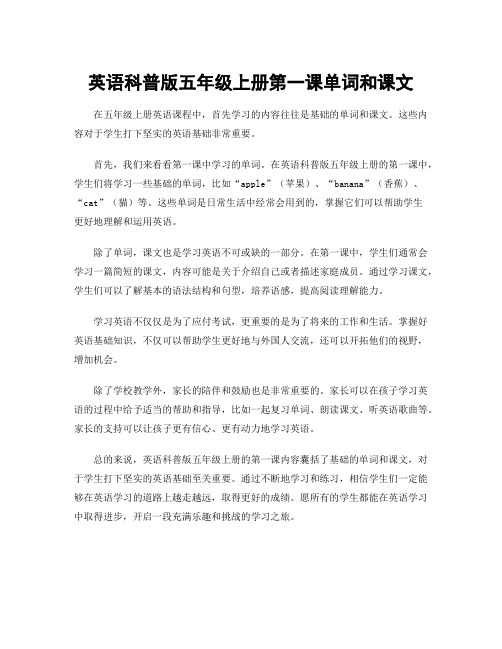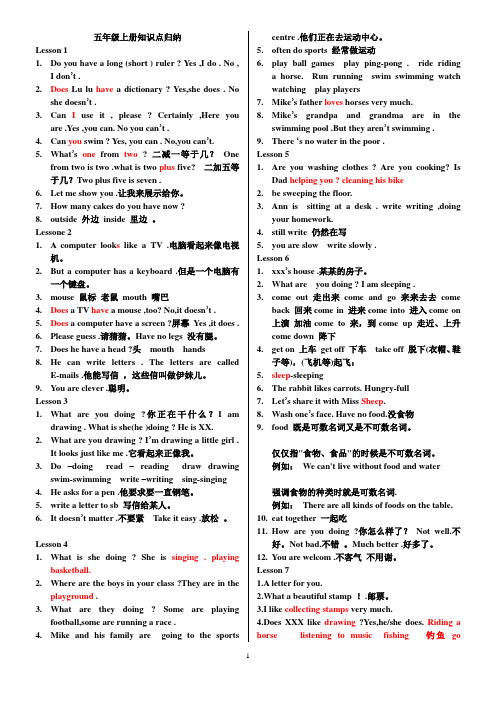科普版五年级上册英语知识点
五年级上册科普版英语课文

五年级上册科普版英语课文一、单词学习。
1. 单词表整理。
- 按照单元顺序,列出每单元的重点单词。
例如:- 第一单元:“clever(聪明的)、quiet(安静的)、active(活跃的)”等。
- 对于每个单词,标注音标、词性(名词n.、动词v.、形容词adj.等)。
2. 单词记忆方法。
- 联想记忆法。
- 如“pest(害虫)”,可以联想“pest”的发音类似“拍死它”,因为害虫是要被拍死的。
- 词根词缀记忆法(如果有适用的单词)- 像“unhappy(不开心的)”,“un - ”是表示否定的前缀,“happy(开心的)”是基础单词。
3. 单词运用。
- 给出单词的常见搭配和例句。
- 例如:“be good at(擅长)”,例句“He is good at English.(他擅长英语。
)”二、课文理解。
1. 课文翻译。
- 逐句翻译课文内容,帮助学生理解课文大意。
- 例如:“This is my new friend.(这是我的新朋友。
)”2. 课文结构分析。
- 划分课文段落,说明每段的主要内容。
- 如某篇课文第一段是介绍人物,第二段是讲述人物的兴趣爱好等。
3. 重点句型解析。
- 找出课文中的重点句型,分析其结构和用法。
- 例如:“What's he like?(他是什么样的人?)”这个句型用于询问某人的性格或外貌特征。
三、语法学习。
1. 语法点总结。
- 按照单元梳理语法知识。
- 如一般现在时的用法(主语是第三人称单数时动词的变化等),在科普版五年级上册可能会涉及到像“He likes reading books.(他喜欢读书。
)”中“like”变成“likes”的情况。
2. 语法练习。
- 针对每个语法点,提供一些练习题。
- 例如:用所给动词的适当形式填空。
“She often ____ (go) to school by bike.”(答案:goes)四、听力与口语练习。
1. 听力训练。
- 提供课文听力材料的获取方式(如教材配套光盘等)。
202X年科普版五年级英语上册全册知识点汇总

千里之行,始于足下。
202X年科普版五年级英语上册全册知识点汇总以下是202X年科普版五年级英语上册全册的知识点汇总:1. 单词:- 实物:apple, book, cat, lion, pencil, clock, etc.- 动作:jump, run, swim, fly, dance, etc.- 数字:one, two, three, four, five, etc.- 颜色:red, blue, green, yellow, etc.- 学科:math, science, art, music, etc.- 人物:teacher, student, doctor, firefighter, etc.2. 句型:- What's your name?(你叫什么名字?)- How old are you?(你多大了?)- I am __ years old.(我__岁了。
)- What do you like?(你喜欢什么?)- I like __.(我喜欢__。
)- What can you do?(你会做什么?)- I can __.(我会__。
)- How many __ do you have?(你有多少__?)- I have __.(我有__。
)3. 课文内容:- 自我介绍:介绍自己的名字和年龄。
- 问候语和告别语:hello, hi, goodbye, bye, etc.- 学科介绍:介绍数学、科学、艺术、音乐等学科。
- 关于颜色:介绍常见的颜色及如何用英语形容颜色。
第1页/共2页锲而不舍,金石可镂。
- 简单动词:介绍常见的动作,如跳跃、奔跑、游泳、飞行、跳舞等。
- 动物世界:介绍一些常见的动物,如猫、狮子等。
- 水果:介绍一些常见的水果,如苹果、香蕉等。
- 学习用品:介绍一些常见的学习用品,如书、铅笔、时钟等。
以上是202X年科普版五年级英语上册全册的知识点汇总,希望对你有帮助!。
英语科普版五年级上册第一课单词和课文

英语科普版五年级上册第一课单词和课文
在五年级上册英语课程中,首先学习的内容往往是基础的单词和课文。
这些内容对于学生打下坚实的英语基础非常重要。
首先,我们来看看第一课中学习的单词。
在英语科普版五年级上册的第一课中,学生们将学习一些基础的单词,比如“apple”(苹果)、“banana”(香蕉)、“cat”(猫)等。
这些单词是日常生活中经常会用到的,掌握它们可以帮助学生
更好地理解和运用英语。
除了单词,课文也是学习英语不可或缺的一部分。
在第一课中,学生们通常会学习一篇简短的课文,内容可能是关于介绍自己或者描述家庭成员。
通过学习课文,学生们可以了解基本的语法结构和句型,培养语感,提高阅读理解能力。
学习英语不仅仅是为了应付考试,更重要的是为了将来的工作和生活。
掌握好英语基础知识,不仅可以帮助学生更好地与外国人交流,还可以开拓他们的视野,增加机会。
除了学校教学外,家长的陪伴和鼓励也是非常重要的。
家长可以在孩子学习英语的过程中给予适当的帮助和指导,比如一起复习单词、朗读课文、听英语歌曲等。
家长的支持可以让孩子更有信心、更有动力地学习英语。
总的来说,英语科普版五年级上册的第一课内容囊括了基础的单词和课文,对于学生打下坚实的英语基础至关重要。
通过不断地学习和练习,相信学生们一定能够在英语学习的道路上越走越远,取得更好的成绩。
愿所有的学生都能在英语学习中取得进步,开启一段充满乐趣和挑战的学习之旅。
科普版英语五年级上册知识点归纳

五年级上册知识点归纳Lesson 11.Do you have a long (short ) ruler ? Yes ,I do . No ,I don’t .2.Does Lu lu have a dictionary ? Yes,she does . Noshe doesn’t .3.Can I use it , please ? Certainly ,Here youare .Yes ,you can. No you can’t .4.Can you swim ? Yes, you can . No,you can’t.5.What’s one from two ? 二减一等于几?Onefrom two is two .what is two plus five? 二加五等于几?Two plus five is seven .6.Let me show you .让我来展示给你。
7.How many cakes do you have now ?8.outside 外边inside 里边。
Lessone 21. A computer look s like a TV .电脑看起来像电视机。
2.But a computer has a keyboard .但是一个电脑有一个键盘。
3.mouse 鼠标老鼠mouth 嘴巴4.Does a TV have a mouse ,too? No,it doesn’t .5.Does a computer have a screen ?屏幕Yes ,it does .6.Please guess .请猜猜。
Have no legs 没有腿。
7.Does he have a head ?头mouth hands8.He can write letters . The letters are calledE-mails .他能写信,这些信叫做伊妹儿。
9.You are clever .聪明。
[荐]科普版英语五年级上册Lesson2必考知识点全总结
![[荐]科普版英语五年级上册Lesson2必考知识点全总结](https://img.taocdn.com/s3/m/81fe08608762caaedc33d458.png)
科普版英语五年级上册Lesson2必考知识点全总结Lesson 2 Don’t be late next time!一,祈使句:A, 定义:表示命令,建议,邀请等。
B, 特点:动词原形开头,省略主语。
a, Do型(以动词原型开头) eg:Sit down.b,Be型(be +形容词) eg:Be quiet.c,Let 型(Let + V原) eg:Let's go.C. 委婉语气用please可放句首,Please close the door.可放句尾,Close the door,please!D,变否定:句首+Don’t.No +动词ing.二,固定搭配:Keep quiet! 保持安静!No spitting! 禁止吐痰Watch your step! 小心台阶No littering! 禁止乱扔垃圾Don’t waste food! 禁止浪费食物三,阅读要点:A fine day: 晴朗的一天want to do something: 想要做某事run on the grass: 在草地上跑Keep off the grass! 禁止践踏草坪do the right thing: 做正确的事单词及词组may 可以park n.公园grass n.草thing n.东西,事情seat n.座位next time 下一次I see .我知道了。
重点句子Why are you late?Because the bus was late.Go to your seat and sit down, please.Don’t be late next time. Keep quiet!No spitting!That’s all right.Watch your step!Don’t waste food!Sit down. (Don’t sit down.) No littering!。
科普版英语五年级上册第五单元知识点汇总 - 副本 (2)

五年级上册---5单元
[本单元主要学习like在特殊疑问句中的用法]
重点词组:listen to music听音乐
see films 看电影
watch TV 看电视
like的特殊疑问句形式:
What do you/you/they like ?
I/we/they like seeing films.
What does she/he like ?
she/he likes seeing films.
交际用语:
What about ......?(用来咨询消息,征求意见的一种用法)
eg: I'm from beiJing. What about you?(我来自北京,你呢?)
listen to ...(意为听...,注意to不要丢掉)
eg: Listen to me.(听我说。)
He is listening to music.(他在听音乐。)
2019-2020年科普版五年级英语上册期末复习知识点【提优卷】
五年级英语科普版同步期末复习知识点★Lesson 1-2一、必考重点词playground 操场sport 运动l ove 爱grandfather 爷爷grandmother 奶奶net 下一个wee 周,星期may 可以par 公园grass 草thing 东西二、常考重点短语play football 踢足球play ping-pong 打乒乓球have a match 比赛net time 下一次come in 进sit d own 坐下三、常考重点句子(会背)1. What are they d oing? 他们正在做什么?2. Don’t be late net time. 下一次不要迟到。
3. I see. 我知道了。
4. That’s all right. 没关系。
★Lesson3-5一、必考重点词TV 电视机every 每个tall 高的ear 耳朵eye 眼睛mouth 嘴巴hand 手write 写email 电子邮件card 卡片sometimes 有时often 经常well健康的listen听music 音乐film 电影always 总是二、常考重点短语every day 每天play basetball 打篮球go fishing 去钓鱼listen to music 听音乐see films 看电影watch TV 看电视三、常考重点句子(会背)1. Does a TV has a screen? 电视机有显示屏么?2. Does Jim lie swimming? 吉姆喜欢游泳么?3. What d oes he lie? 他喜欢什么?★Lesson7-8一、必考重点词shop商店buy 买drin 喝juice 果汁tea 茶feel 感觉much 非常vegetabl e 蔬菜potato 土豆tomato 西红柿train 火车arm 手臂cry 哭wrong 错误的worry 担心二、常考重点短语woul d lie 想要a cup of 一杯a bottle of 一瓶a glass of 一杯a bag of 一包三、常考重点句子(会背)1. What would you lie? 你想要什么?2. Woul d you lie some tomatoes? 你想要一些西红柿么?3. Coul d I have some cabbages? 我可以要一些卷心菜么?4. What’s wrong ?怎么了?★Lesson9-11一、必考重点词chicen鸡肉half 一半twenty 20 fruit 水果now 知道cl ever 聪明的child 孩子small 小的food 食物bac向后its 它的tell 告诉story 故事hear 听见二、常考重点短语how much 多少钱in front of 在……前面say goodbye to 向……道别go shopping 去购物l ots of 许多三、常考重点句子(背会)1. How many caes d o you want? 你想要多少蛋糕?2. How much meat d o you want? 你想要多少肉?3. There is a horse und er the tree. 树下有一匹马。
五年级上册英语课文科普版
五年级上册英语课文科普版一、单词部分。
1. 单词分类记忆。
- 按照单元主题分类,例如如果第一单元是关于学校的,将school(学校)、classroom(教室)、teacher(教师)、student(学生)等单词归为一类。
这样有助于在描述学校场景时联想记忆单词。
- 按照词性分类,像名词(noun):book(书)、desk(书桌);动词(verb):read(读)、write(写);形容词(adjective):big(大的)、small (小的)等。
2. 单词记忆技巧。
- 利用自然拼读法。
例如,“cat”这个单词,c发/k/音,a发/æ/音,t发/t/音。
对于一些符合发音规则的单词,通过自然拼读可以快速准确地记忆。
- 制作单词卡片。
在卡片的一面写单词,另一面写单词的释义、例句或者音标。
可以随时随地拿出来复习,自我测试。
3. 重点单词举例。
- 课本中可能会有一些日常活动相关的重点单词,如“get up(起床)”“go to school(去上学)”“have lunch(吃午饭)”等。
这些单词在描述日常作息时经常用到。
二、语法部分。
1. 一般现在时。
- 概念:表示经常发生的动作或存在的状态。
例如:I go to school every day.(我每天去上学。
)- 动词形式:当主语是第三人称单数(he/she/it等)时,动词要加 -s或 -es。
如:He likes reading books.(他喜欢读书。
)- 句型结构:肯定句:主语+动词原形(第三人称单数加 -s或 -es)+其他;否定句:主语+don't/doesn't+动词原形+其他;一般疑问句:Do/Does+主语+动词原形+其他?2. There be句型。
- 概念:表示“某地有某物”。
例如:There is a book on the desk.(桌子上有一本书。
)- 用法:be动词的形式取决于后面的名词是单数还是复数。
[荐]科普版英语五年级上册Lesson9必考知识点全总结
科普版英语五年级上册Lesson9必考知识点全总结
Lesson 9 How many cakes do you want?
一,复习可数名词和不可数名词
二,How many 与How much 的区别:
How many + 可数名词复数...?
用来询问可数名词数量。
How much + 不可数名词...?
用来询问不可数名词数量。
How much 也可询问价钱
三,常用固定搭配:
What can I do for you?= Can I help you? 我能为你做些什么吗?How much is it? 多少钱?
Is that all? 就要这么多了吗?
四,阅读要点
the fruit shop: 水果店in all: 总共
单词及词组
chicken n.鸡,鸡肉half一半
twenty二十
fruit n.水果
know v.知道
clever adj.聪明的anything任何事物else其他的
kilo千克
show n.展示
how much多少钱
重点句子
How many cakes do you want? (对可数名词提问) Four.
How much chicken do you want? (对不可数名词提问) I want half a kilo.我想要半千克。
Here you are.给你。
Here it is.给你。
Here is the money.给钱。
科普版-英语-五年级上册-【新版】科普版五上Lesson 4同步课件
• 2、“like”后接名词,即like sth.的用 法。
• 基本句式如下:
• 肯定句: I like music。
•
She likes music.
• 否定句:I don't like music.
•
She doesn't like music.
2020/7/30
Let's learn
• —Does Jim like swimming? • 吉姆喜欢游泳吗? • —Yes, he does. • 是的,他喜欢。 • —No, he doesn't. • 不,他不喜欢。
• —Yes, I do./No, I don't.
• — Does she like dancing?
• —Yes, she does./No, she doesn't.
•
特殊疑问句:
• —What do you like?
• —What does she like?
2020/7/30
like 的用法
2020/7/30
练一练
• Jim是第三人称单数形式,所以在一般疑问 句 中,不能以do开头,而要以Does开 头,回答时也要用does回答。
• 替换句子
• Ann ,skating • 安,滑冰
• Does Ann like skating? • Yes, she does./No, she doesn't.
2020/7/30
like 的用法 • 例:陈述句:I like dancing.
•
She likes dancing.
•
否定句:I don'esn't like dancing.
- 1、下载文档前请自行甄别文档内容的完整性,平台不提供额外的编辑、内容补充、找答案等附加服务。
- 2、"仅部分预览"的文档,不可在线预览部分如存在完整性等问题,可反馈申请退款(可完整预览的文档不适用该条件!)。
- 3、如文档侵犯您的权益,请联系客服反馈,我们会尽快为您处理(人工客服工作时间:9:00-18:30)。
五年级英语科普版 Lesson 1 单词及词组 playground n.操场sport n.运动 love v.爱(loves)grandfather n.爷爷grandmother n.奶奶,外婆next 下一个 week n.星期 classroom n.教室 center n.中心 ping-pong n.乒乓球 tennis n.网球 play football踢足球 play ping-pong打乒乓球 play tennis 打网球 have a match比赛 ride a bike骑自行车 fly a kite放风筝 sports centre运动中心 ride a horse骑马 重点句子 What is he/she doing He/She is V-ing(动词ing形式). What are they doing They are V-ing. Where is XXX He/She is + 地点. They are going to have a match with their friends next week. Lesson 2 单词及词组 may 可以 park n.公园 grass n.草 thing n.东西,事情 seat n.座位 next time 下一次 I see 我知道了 重点句子 Why are you late Because the bus was late. Go to your seat and sit down, please. Don’t be late next time. Keep quiet! No spitting! That’s all right. Watch your step! Don’t waste food! Sit down. (Don’t sit down.) No littering! Lesson 3 单词及词组 TV n.电视机 every每一个 tall adj.高的 ear n.耳朵 eye n.眼睛 mouth n.嘴巴 hand n.手 write v.写 email n.邮件 keyboard n.键盘 mouse n.鼠标,老鼠 every day 每天 play with sb. 和…一起玩 have a guess猜一猜 write letters写信 重点句子 A computer has a keyboard. Does a TV have a mouse No, it doesn’t. Does a TV have a screen Yes, it does. Does he/she …….. Yes, he/she does. No, he/she doesn’t. Is he/she …….. Yes, he/she is. No, he/she isn’t. Lesson 4 单词及词组 card n.卡片 sometimes有时 often经常 well adj.健康的,好 skate v.滑冰 play basketball 打篮球 go fishing去钓鱼 on Sundays在周日 in summer在夏天 play cards打纸牌 重点句子 Does Jim likes swimming Yes, he does. No, he doesn’t. Do you like xxxx Yes, I does. No, I don’t. What’s your favourite sport Lesson 5 单词及词组 listen v.听 listen to… 听… music n.音乐 film n.电影 always总是 only仅仅,只 everyone每一个 enjoy v.喜欢,享受 cartoons卡通 listen to music听音乐 see films看电影 watch TV看电视 take photos拍照 read books读书 see TV plays看电视剧 重点句子 What do you like I like XXXX. What does he/she like He/She likes XXXX. What do you like to do in your free time I like XXX. Lesson 6 单词及词组 take v.拿 take a look 看一看 let’s=let us让我们 Let’s go and take a look. Lesson 7 单词及词组 shop n.商店 buy v.买 drink v.喝 n.饮料 tea n.茶 juice n.果汁 feel v.感觉 much多,非常 something某事物 would将要 share分享 bottle n.瓶子 carrot n.胡萝卜 would like想要 a bottle of一瓶 a cup of tea一杯茶 a bottle of coke一瓶可乐 a glass of water一杯水 重点句子 What would you like I’d like some tea. Can I help you = What can I do for you Would you like ……… Yes, please. No, thanks. Here you are. How are you feeling I’m not feeling well. Lesson 8 单词及词组 vegetable n.蔬菜 potato n.土豆 train n.火车 arm n.手臂 cry v.哭喊 wrong adj.错误的 worry v.担忧 could可以 money n.钱 ticket n.票 take a train坐火车 a ticket to…去…的票 重点句子 We want some vegetables. Would you like some potatoes Yes, please. Could I have some tomatoes, too Sure. How much are they There is some bread in the fridge. No hot dogs for you. He wants to take a train to Anshan. What’s wrong Don’t worry. Lesson 9 单词及词组 chicken n.鸡,鸡肉 half一半 twenty二十 fruit n.水果 know v.知道 clever adj.聪明的 anything任何事物 else其他的 kilo千克 show n.展示 how much多少钱 重点句子 How many cakes do you want (对可数名词提问) Four. How much chicken do you want (对不可数名词提问) I want half a kilo. Here you are. Here it is. Here is the money. Lesson 10 单词及词组 child n.儿童(复数children)small adj.小的 food n.食物 back向后,背 its它的 forest n.森林 village n.村庄,乡村 other别的,其他的 in front of在…前面 say goodbye to向…道别 go back to回到 重点句子 What’s in front of the house What are behind the house There is + a/an + 名词单数 + 地点。 There is a tree in front of the house. There are + 名词复数 + 地点。 There are some goats behind the house. Lesson 11 单词及词组 tell v.告诉 story n.故事 hear v.听见 fridge n.冰箱 either也不 hometown n.家乡,故乡 island n.岛 sea n.海 piano n.钢琴 sound n.声音 everywhere到处 go shopping购物 lots of许多,大量 tell stories about讲…的故事 重点句子 There isn’t any bread in the fridge. Is there any beef in the fridge Yes, there is. No, there isn’t. Are there any eggs Yes, there are. No, there aren’t. Lesson 12 单词及词组 ice cream n.冰激凌 milk n.牛奶 police n.警察stay v.停留 thief n.贼 knock v.敲 knock at the door敲门 by the way顺便问一下 特殊疑问句问答 What is he/she doing He/She is V-ing(动词ing形式). What are they doing They are V-ing. Where is XXX He/She is + 地点. Why are you late Because the bus was late. What’s your favourite sport My favourite sports is …… What do you like I like XXXX. What does he/she like He/She likes XXXX. What do you like to do in your free time I like XXX. What would you like I’d like some tea. How are you feeling I’m not feeling well.
